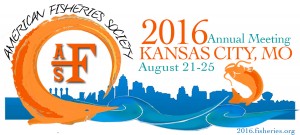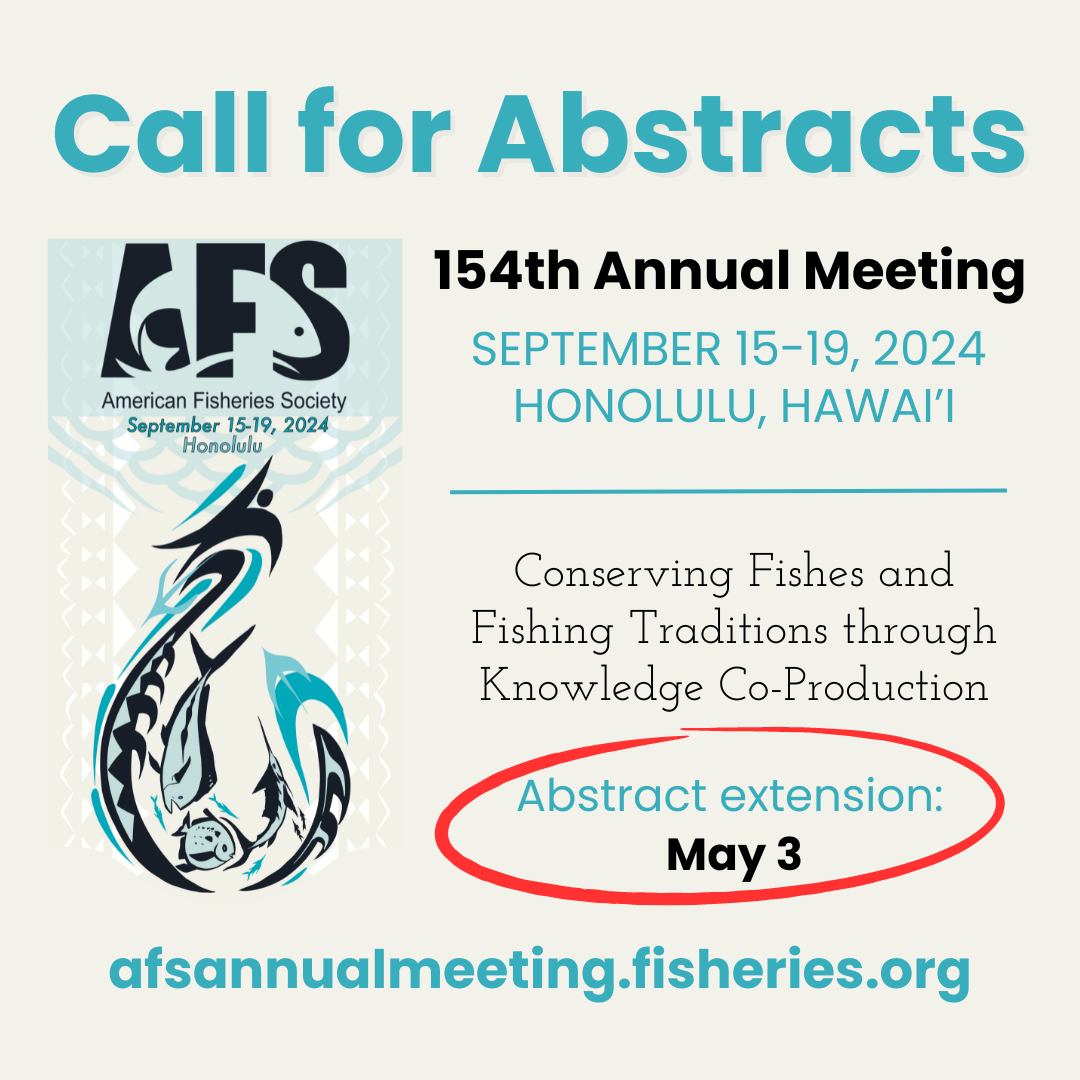Contact: Martha Wilson
Tel.202.445.9514
[email protected]
American Fisheries Society returns to KC with participants from around the world
 (Bethesda, MD) August 21, 2016 – Fisheries scientists and professionals from around the country and around the world will gather in Kansas City from August 21-25 for the annual meeting of the American Fisheries Society (AFS), which will feature hundreds of presentations on the latest advances in fisheries research and conservation. AFS is dedicated to strengthening the fisheries profession, advancing fisheries science, and conserving fisheries resources. Membership is mostly drawn from the scientific community but also includes fisheries professionals such as managers, administrators, educators and consultants.
(Bethesda, MD) August 21, 2016 – Fisheries scientists and professionals from around the country and around the world will gather in Kansas City from August 21-25 for the annual meeting of the American Fisheries Society (AFS), which will feature hundreds of presentations on the latest advances in fisheries research and conservation. AFS is dedicated to strengthening the fisheries profession, advancing fisheries science, and conserving fisheries resources. Membership is mostly drawn from the scientific community but also includes fisheries professionals such as managers, administrators, educators and consultants.
“This is a tremendous opportunity for experts in the field to share what they’re learning and build their knowledge, which benefits science and, of course, the ecosystem,” said Ron Essig, president of the American Fisheries Society. “During the past 30 years there have been regional efforts focused on river restoration along the Big Muddy to boost ecological support along the Missouri River. So it is especially significant that fisheries scientists and experts are gathering here in Kansas City along the banks of the river.”
The AFS conference and associated trade show will take place at the Kansas City Convention Center and will feature keynote addresses by globally renowned fisheries scientists. Hundreds of scientific abstracts have been submitted for presentation at dozens of symposia featuring key topics and emerging issues in fisheries science. More than 1,000 are expected to attend the conference.
“This event gives us a chance to share the region’s expertise in fisheries science as well as things that make Kansas City special, from our barbeque to our baseball,” said Vince Travnicheck, coordinator of the AFS conference. “Missouri is blessed with an abundance of aquatic resources ranging from our two Great Rivers, the Missouri and Mississippi, to beautiful Ozark streams, and from our largest of reservoirs such as Truman Lake to small ponds found on the James Reed Conservation Area in Lee’s Summit. We are excited to have fisheries professionals from around the world come and share their knowledge with us, while at the same time allowing us to share the Show-me State and Kansas City with them.”
Conference topics range from the effects of climate change on fish populations to new approaches and technology for fisheries research, aquatic ecosystems health, invasive species, river restoration, fisheries management, climate change impacts, “angling for dinosaurs,” salt and fresh water systems, and new fisheries and research technology. Other events will include a community race (called the “fish spawning run”), a plenary address from National Geographic TV’s “Monster Fish Guy” (Zeb Hogan), and fish sausage-making events.
# # #
Editor’s Notes:
Visit the conference website or APP (“AFSAnnualMeetings”) for more information and follow the conference on Facebook (@AmericanFisheriesSociety) and Twitter (@AmFisheriesSoc) for the latest news and details on registration and events.
Founded in 1870, the American Fisheries Society (AFS) is the world’s oldest and largest fisheries science society. The mission of AFS is to improve the conservation and sustainability of fishery resources and aquatic ecosystems by advancing fisheries and aquatic science and promoting the development of fisheries professionals. With five journals and numerous books and conferences, AFS is the leading source of fisheries science and management information in North America and around the world.
The Missouri River is the longest river in the United States, and has a rich history dating back to the Lewis and Clark Expedition over 200 years ago. While the river’s ecology has been altered over the years by the effects of man for flood control, navigation and transportation, water supply, energy needs, and recreational activities, it is still an important resource along its course, and restoration efforts are underway to reduce some of the ecological impacts that humans have caused.


 (Bethesda, MD) August 21, 2016 – Fisheries scientists and professionals from around the country and around the world will gather in Kansas City from August 21-25 for the annual meeting of the American Fisheries Society (AFS), which will feature hundreds of presentations on the latest advances in fisheries research and conservation. AFS is dedicated to strengthening the fisheries profession, advancing fisheries science, and conserving fisheries resources. Membership is mostly drawn from the scientific community but also includes fisheries professionals such as managers, administrators, educators and consultants.
(Bethesda, MD) August 21, 2016 – Fisheries scientists and professionals from around the country and around the world will gather in Kansas City from August 21-25 for the annual meeting of the American Fisheries Society (AFS), which will feature hundreds of presentations on the latest advances in fisheries research and conservation. AFS is dedicated to strengthening the fisheries profession, advancing fisheries science, and conserving fisheries resources. Membership is mostly drawn from the scientific community but also includes fisheries professionals such as managers, administrators, educators and consultants.


